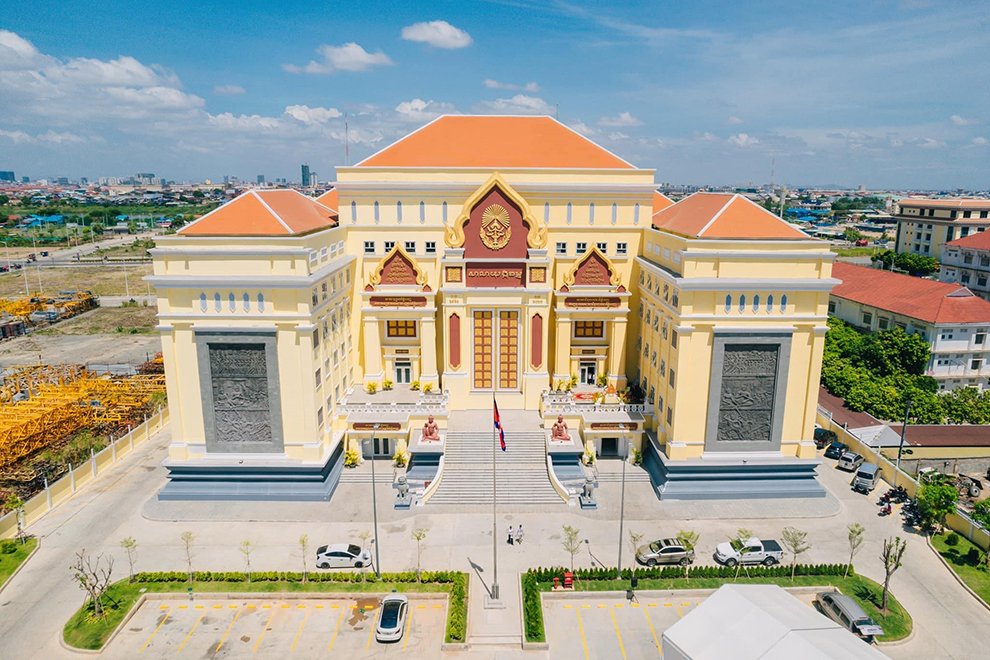
Phnom Penh Municipal Court in the OCIC development area of the capital’s Chroy Changvar district. Phnom Penh Municipal Court
The Ministry of Justice reported that more than 78,000 cases have been settled at the capital and provincial levels within the first six months of its campaign to expedite resolutions.
Overseen by justice minister Koeut Rith, the initiative aims to improve the service and quality of justice across the country.
"From January 9 to July 9, 2024, courts and prosecutors at the capital and provincial levels managed 78,365 criminal, civil and other cases, accounting for 64 per cent of the total 121,553," a ministry spokesman announced on July 11.
He noted this includes 57,689 cases predating the campaign and 63,864 new ones that emerged in the six months following its launch.
"The rapid resolution of cases is a testament to our commitment to providing swift justice for the people," the spokespe said.
The task force committee expressed appreciation for the achievement, highlighting the significant reduction in backlogged cases and the efficient handling of new ones.
The campaign also focused on engaging citizens to report perceived irregularities in court actions. In the six months since its inception, a total of 1,474 complaints were lodged with the secretariat of task force committee.
According to the announcement, the grievances were divided into two main categories. Firstly, there were 786 complaints (53 per cent) requesting expedited case resolutions. Of these, 630 (80 per cent) were successfully settled. Secondly, there were 698 complaints [47 per cent] calling for investigations into suspected irregularities.
The commission handled 36 per cent of these cases. Specifically, the tribunal's special task force reviewed 100 complex cases, finding that 73 were adjudicated with justified reasons.
Fourteen cases required further examination, nine were referred for inspection, and in four cases, irregularities were confirmed, allowing the parties to request retrials.
"The ministry's initiative to investigate and resolve irregularities is a crucial component of our reform efforts," the spokesman added. "We are committed to addressing these issues promptly and transparently."
As part of the campaign, the secretariat facilitated the provision of 92 volunteer lawyers, who are advisers to the ministry.
These lawyers provided free defence services to citizens applying through the initiative, enhancing access to legal representation for those in need.
Focus on priority cases
The campaign identified four priority areas: civil status and traffic, drug and gang-related cases. Considerable progress was made in each of these areas.
“In civil registration cases, the courts resolved all 4,983 pending … cases by March 22, 2024. Additionally, 19,798 of the 21,835 new civil cases were settled, representing a 90 per cent resolution rate,” said the announcement.
For traffic cases, the courts completed 2,438 out of 3,460 nationwide (70 per cent). Among the 1,041 cases existing before the campaign, 893 were resolved (86 per cent), with plans to address the remaining 148 cases by September 2024.
The task force emphasised the careful consideration of compensation for traffic accident victims and strict legal action against offenders.
In handling drug cases, the campaign adhered to the principles of transparency and legality, with regular press releases issued at all prosecution and court stages.
No irregularities were reported, even as the campaign called for public cooperation to maintain law enforcement's efficiency and openness.
Since May 23, courts and prosecutors nationwide have addressed 297 gang-related cases involving 1,616 suspects. This rigorous approach aimed to ensure safety and social order.
Expert analysis and recommendations
Lao Mong Hay, a political analyst, said the court's endeavour to resolve numerous outstanding cases over the past six months is commendable.
“It is often said that justice delayed is justice denied, so prompt case resolution is essential. However, the focus on quantity should not compromise the quality of justice delivered,” Mong Hay said.
He also raised important points regarding the overall improvement of the judicial system, saying there is a need for a law prohibiting court officials from participating in political activities to ensure judicial impartiality.
“It has been suggested to provide cooperation and resources to the King, enabling him to actively fulfill his role as a guarantor of the court's independence,” Mong Hay told The Post, “Strengthening the King’s role could enhance credibility and trust in the judicial system.”
He further suggested simplifying the complaint filing process. He said currently, complaints against judges and prosecutors must be filed with the justice ministry in Phnom Penh, which is inconvenient for those in the provinces.
Mong Hay said allowing complaints to be filed in the court hearing the case would make the system more accessible.
Finally, he recommended shifting judicial education and training responsibilities to the Supreme Council of the Magistracy.
“This move could lead to more specialised and effective training programmes for the judiciary,” he said.












